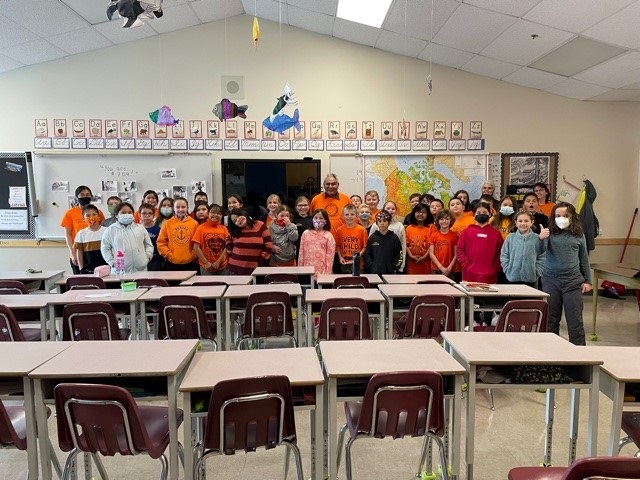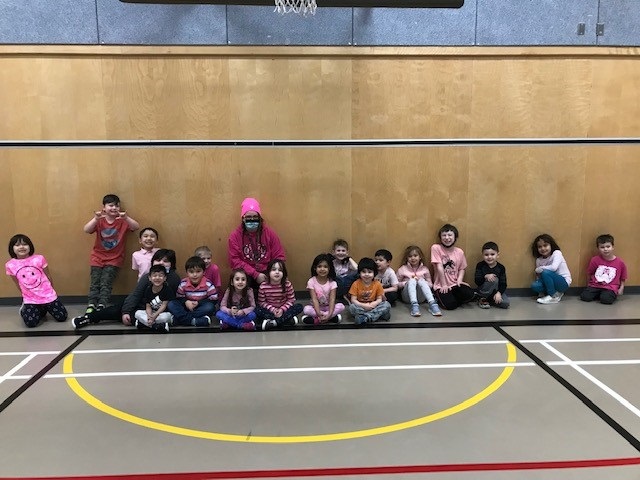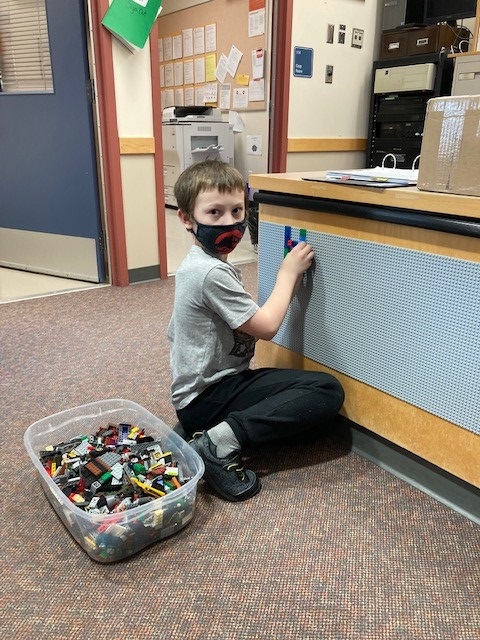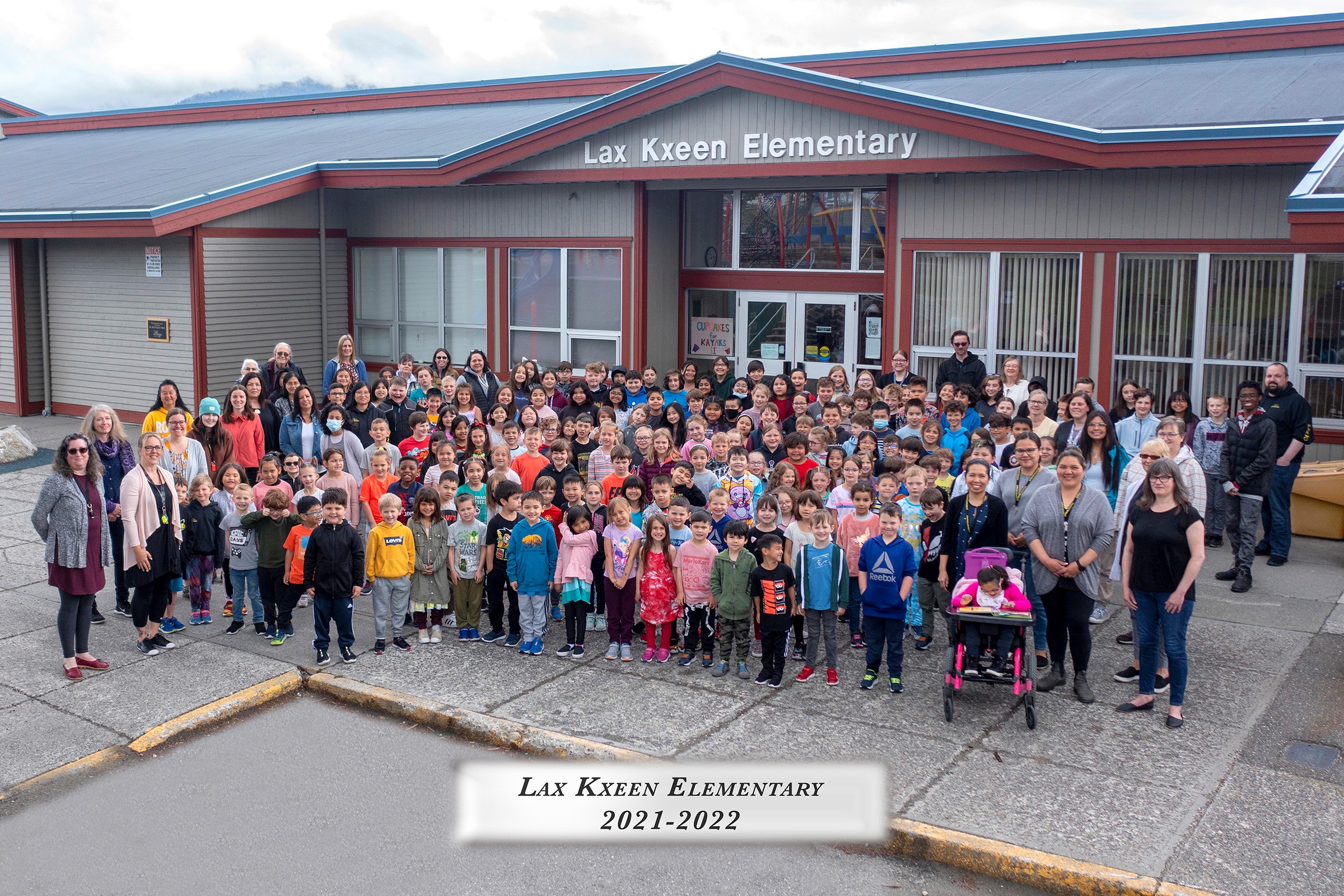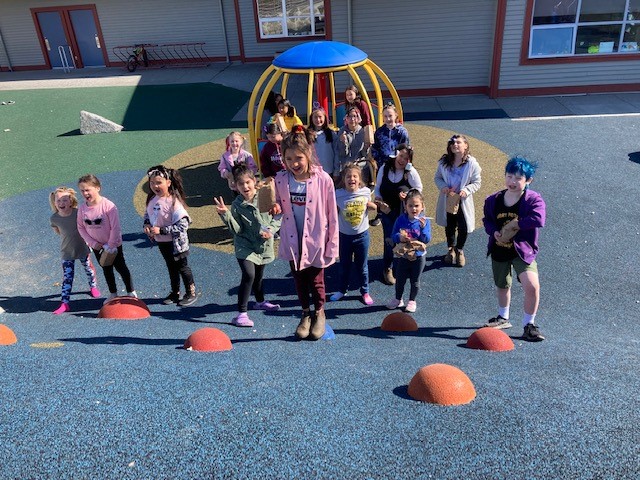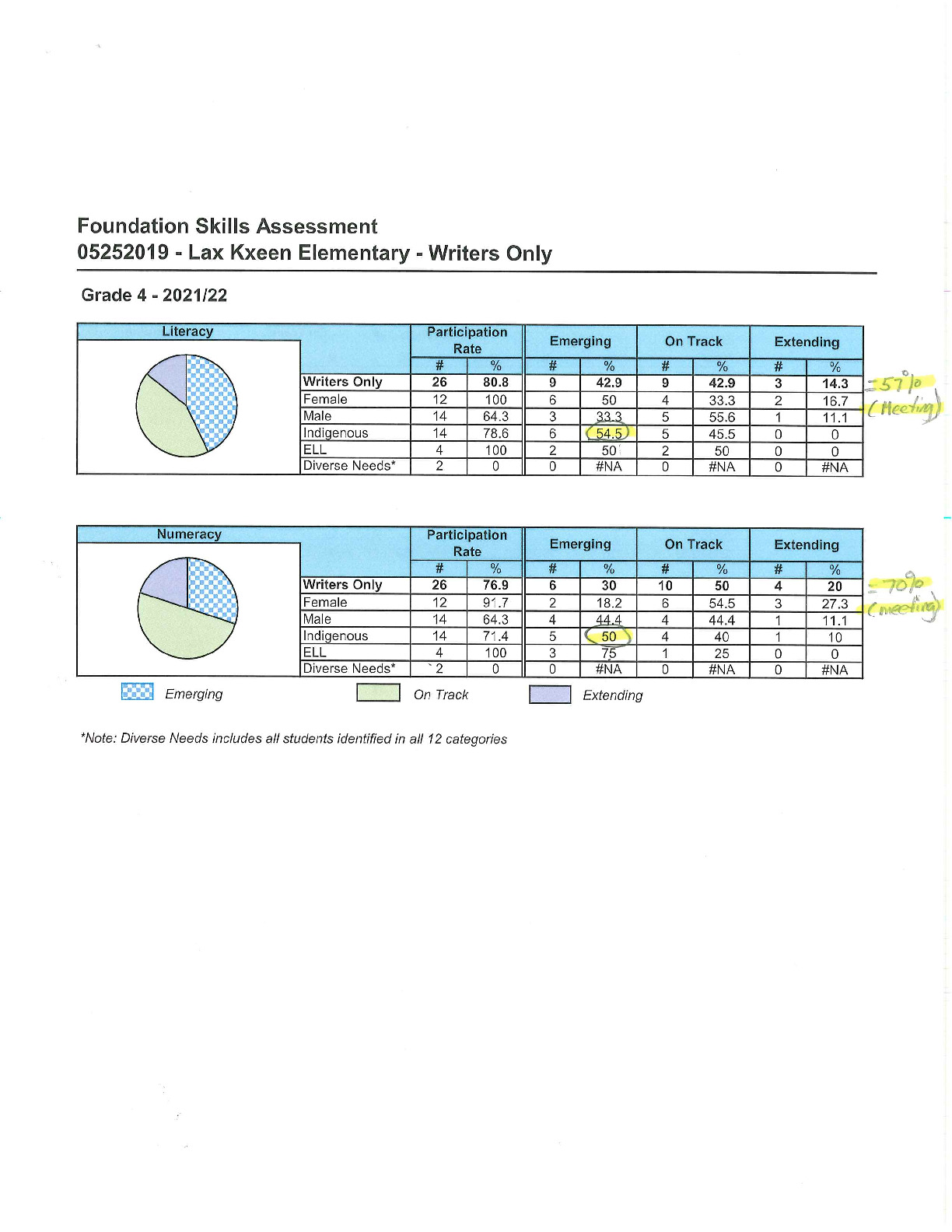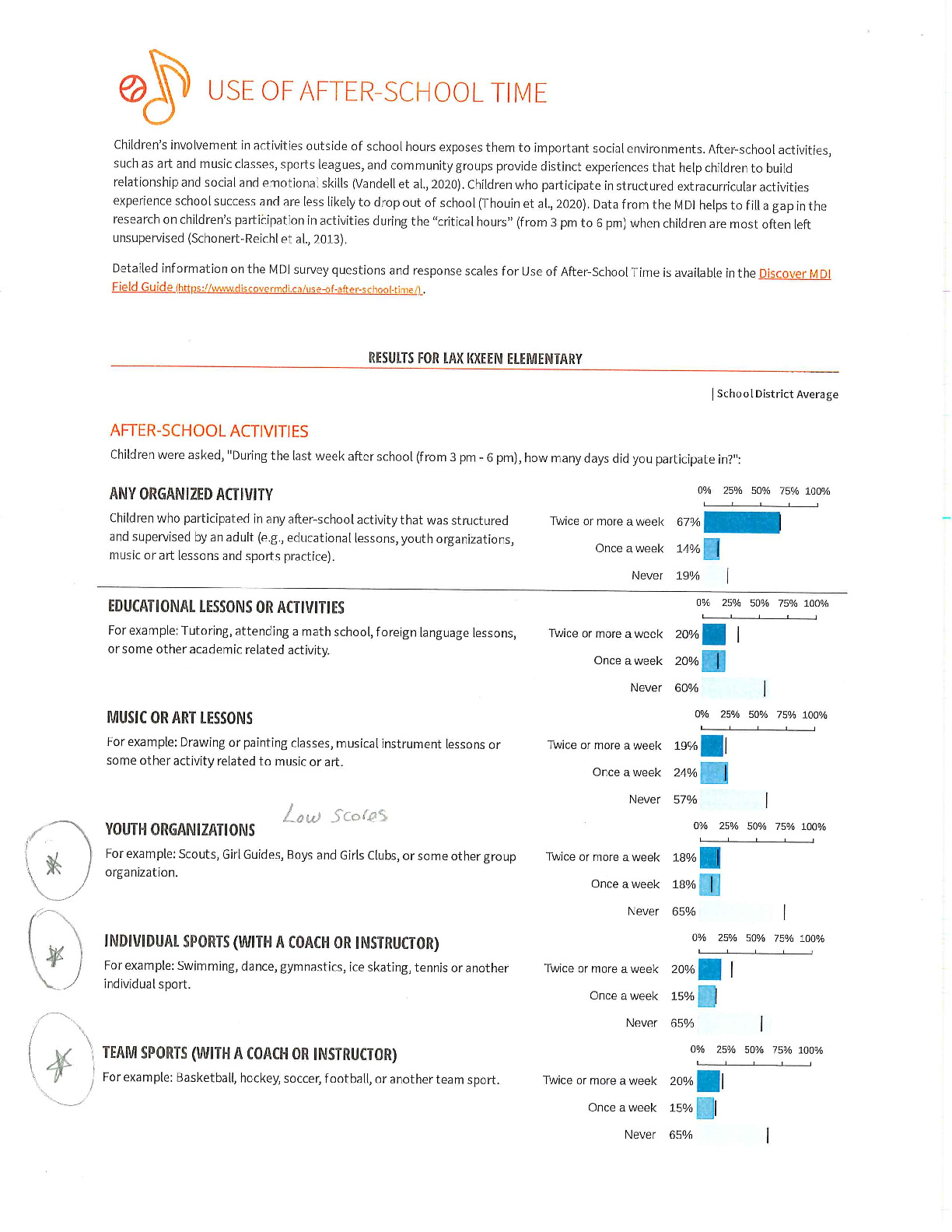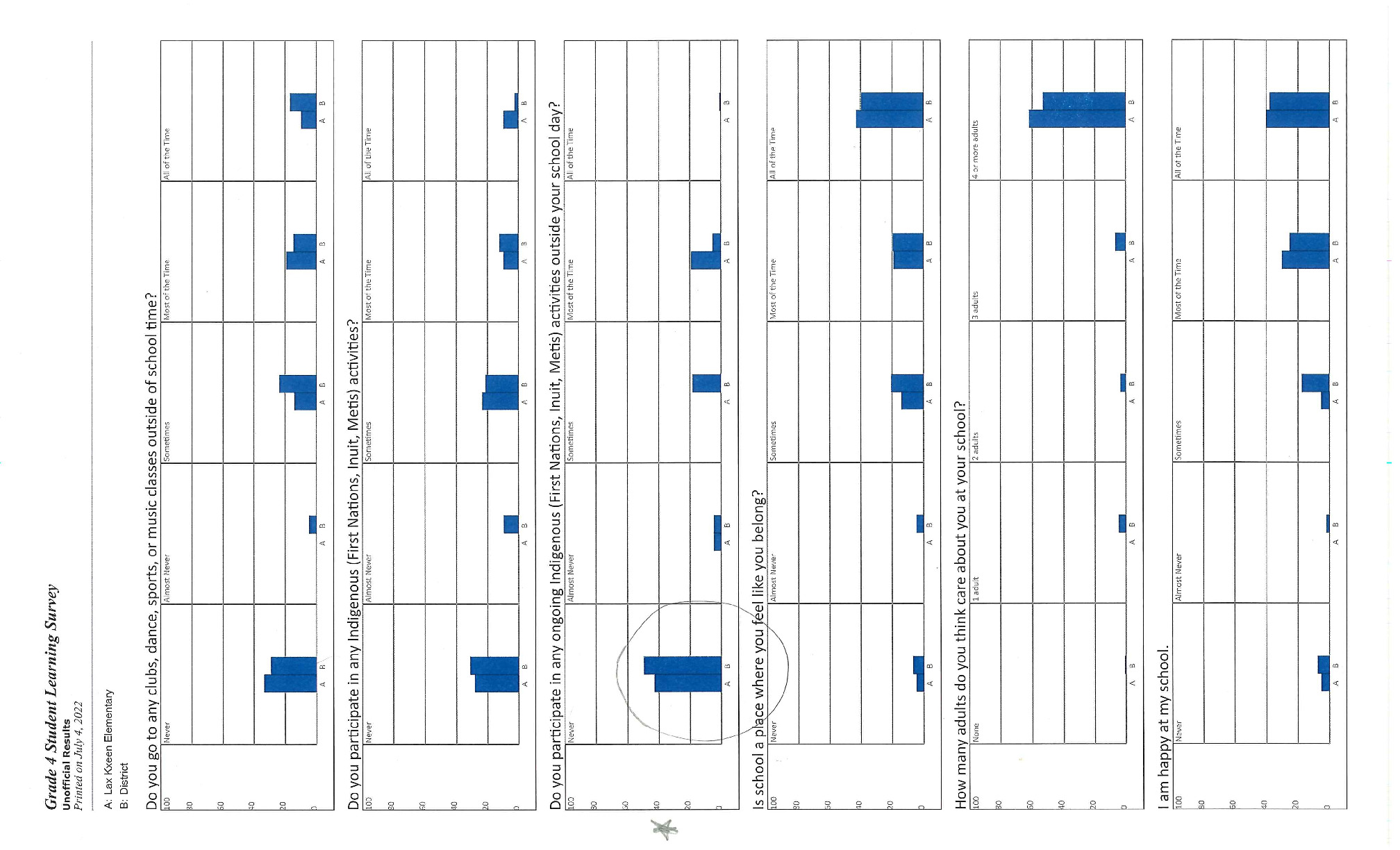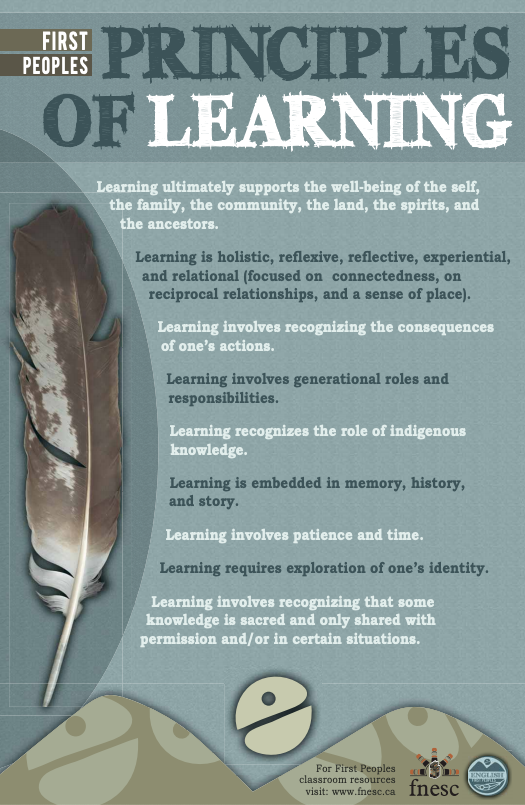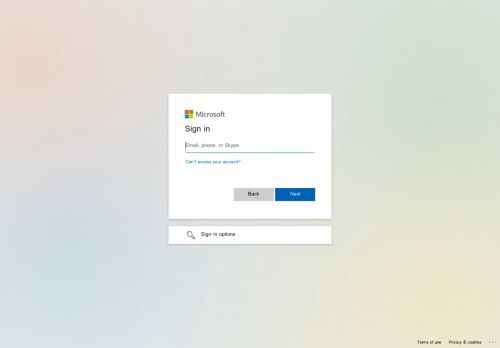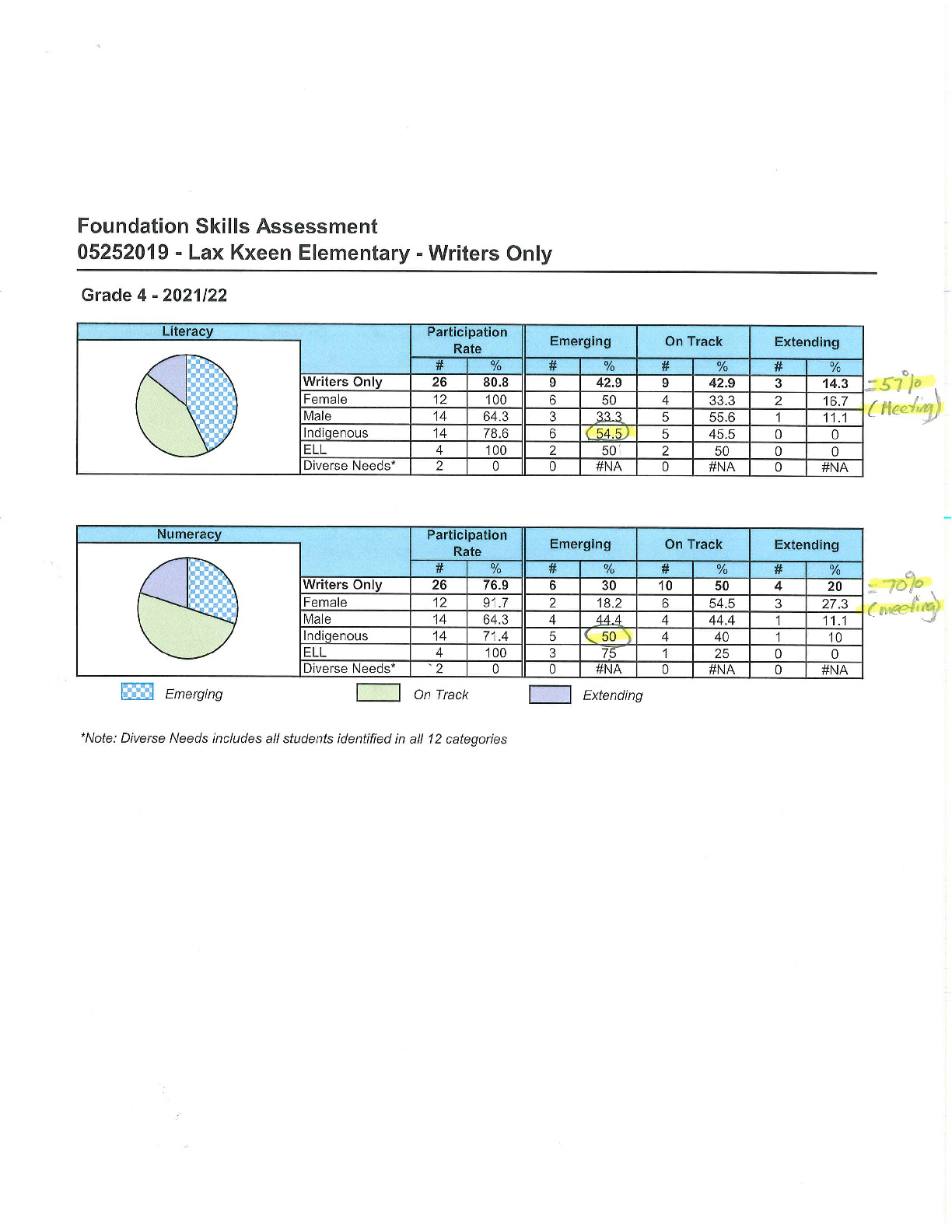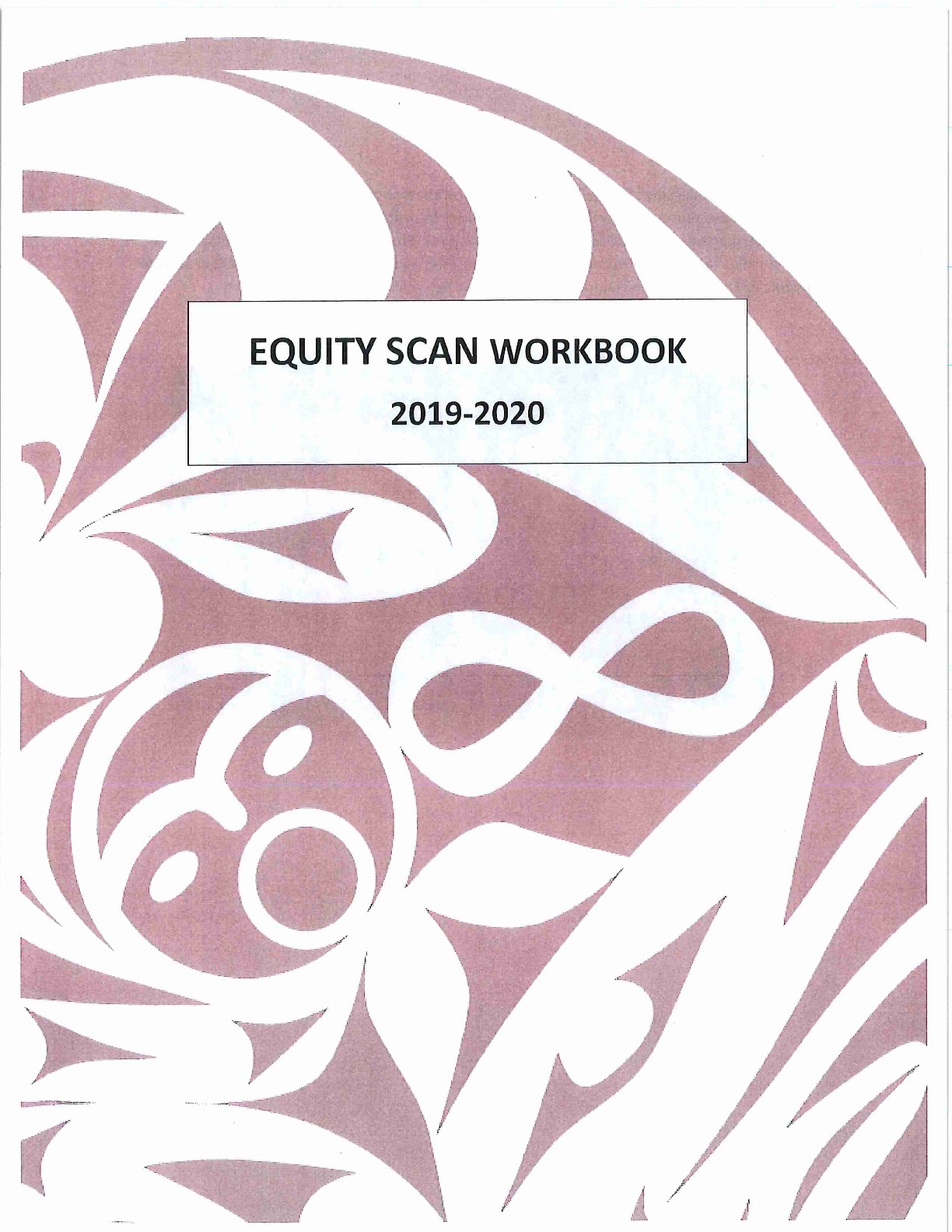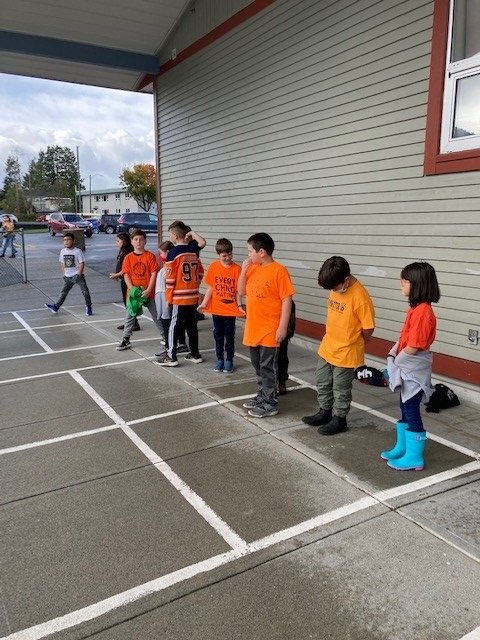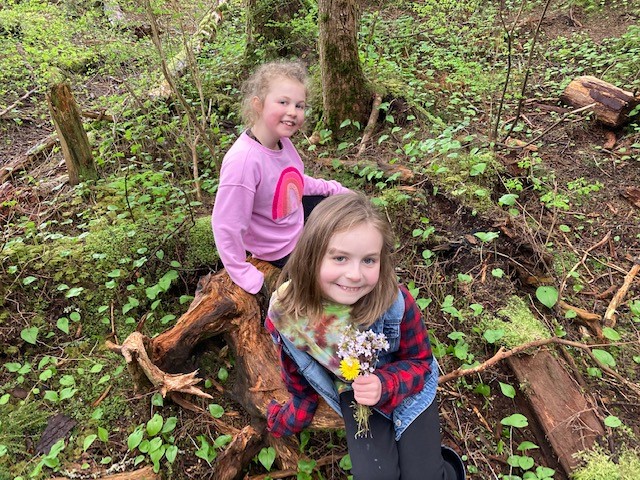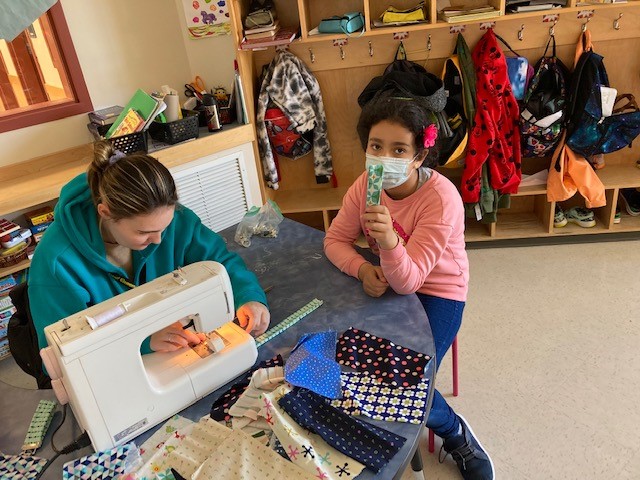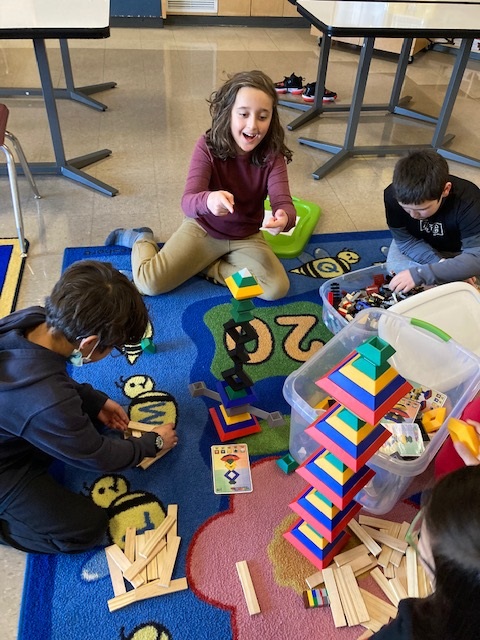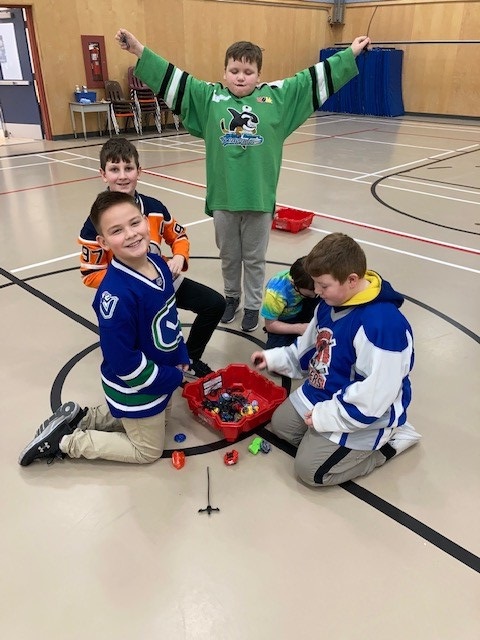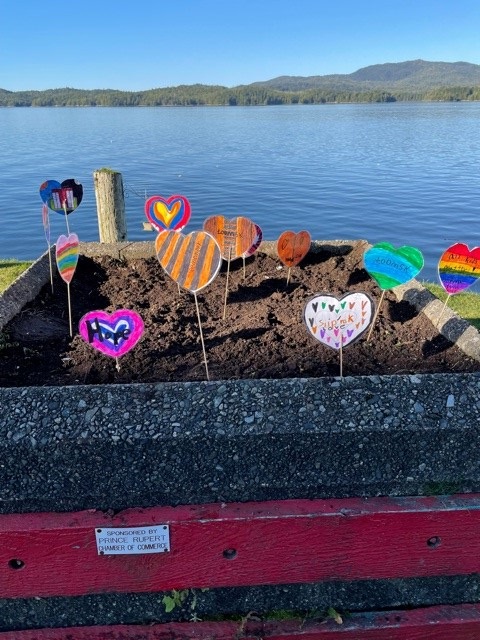![]() Lax Kxeen Elementary School Plan 2022
Lax Kxeen Elementary School Plan 2022
What is your big question?
What is going on for our learners?
School Background Information:
Lax Kxeen (meaning ‘Kaien Island’) Elementary School is located in Prince Rupert, a small city on the North Coast of British Columbia. Lax Kxeen was built in 2000 and was the first school in School District 52 to be given a Ts’msyen name. Lax Kxeen is a K-5 school with a culturally diverse population. The cultural make-up of our school consists of : Indigenous, Caucasian Vietnamese, East Indian and a mix of European decent. Currently our enrollment is 187 students of which 50% are of Indigenous ancestry. In addition, we have the highest rate, approximately (40%) in the district of cross-boundary applications. A number of families are choosing to attend Lax Kxeen as opposed to their neighbourhood school. It currently offers both a daycare and a before-and-after school care program as well as a Strong Start Centre 5 mornings a week and it's location is central in the city of Prince Rupert.
Our learners:
This year saw many students return to school after being away from school for a year and a half. The results of our data indicate that students have progressed in their academics and social emotional learning during the 2021-22 school year but still have a long ways to go to close the gap of learning loss during the pandemic. Since April 2022, school life has gone back to normal and we were able to engage in "normal" year end celebrations. A sense of belonging and school community was re-established once again.
Kindergarten data is compelling this year due to our strong lead teacher in the kindergarten classroom. Mrs. Trask is researching the Science of Reading and implementing this approach in her classroom as well as assisting other primary teachers to get on board to teach their students how to read using this methodology. Included is this document is the Grade 1 reading data for this year. The evidence of the number of students meeting expectations in reading is compelling in the 2 classes who used the Science of Reading methodology to teach the alphabet and sounds to provide a strong foundation for teaching reading in the primary grades.
Reading Benchmarks data for Grades 3 and 5 students continues to be low due the learning loss due to the pandemic in 2020-21. The data is hovering around the 50% mark of students not yet meeting in reading in these grade levels. We need to address this during our Intermediate Literacy blocks during the 2022-23 school year.
FSA data from Fall 2021 demonstrates that between 30 % - 40 % of our Grade 4s are not meeting expectations in the areas of reading, writing and numeracy. We need to focus our efforts on closing the gap between Indigenous (50% not meeting) and Non-Indigenous learners.
The School District survey : Framework For Enhancing Student Learning( FESL) showed that our students in Grades 1-5 scored lower in terms of their positive attitudes and views about reading and numeracy. Will focus on addressing student's skills and confidence in these areas.
This year's MDI results for our schools' Grade 4 students in the section of Peer Belonging is somewhat concerning as only 52% indicate that they feel a sense of belonging to a social group .eg, " When I am with other kids my age, I feel I belong." We attribute this to the limited socialization opportunity students had during the pandemic years. The MDI instrument also indicated that our students need to be more connected to community extracurricular activities such as group or individual sports, clubs, etc..
The results of the Student Learning Survey completed by the Grade 4 students in the spring of 2022 the scores for students related somewhat to community involvement with extra curricular activities, more specifically participating in Indigenous activities outside of the school day.
What will have the biggest impact?
Focus on what equity really means, provide staff with in service on the definition and that we need to be aware of low expectations we may have for the various cultural groups at our school. We have a number of Vietnamese families we need to consider and address the barriers they may be facing in the school system. we have a staff member who is able to translate for our families which is very beneficial.
Ensure that staff are aware of Standard 9 and that it is embedded cross-curricular during the school year. The First Peoples Principles of Learning are powerful and easy to imbed in every day teaching.
Teachers have the greatest impact on the learning environment and if students feel accepted and a sense of belonging in our school community, mental health and academics will grow and thrive.
Our school beliefs which we teach on a regular basis addresses all areas of social emotional learning- Respect, Ownership, Community and Success
These beliefs are in place to ensure every student, staff and parents/guardians feel a sense of belonging and safety at our school. The Lax Kxeen Code of Conduct expands on our school beliefs and how we use Restitution to resolve conflicts.
A book club around the theme of equity and mental health would be invaluable.
It is the duty of School Leaders to guide and ensure staff receive in service and training in this area. monthly staff meetings include an indigenous focus and teaching.
Staff use consistent common resources to teach reading and numeracy. For example, the primary team (K to Grade 2) use the Heggerty Phonemic Awareness Program and the Intensive Phonological Awareness Program so that learners attain important fundamental skills required to ensure a high percentage of our students are reading by the end of Grade 3. Teachers use the strategies and resources from Carol Fullerton.
What is leading to this situation?
Examining the data sources listed in #3 Focus of this plan leads us to our goal of Equity to address mental health as well as 57% of our students in Grade 4 not meeting expectations in reading and writing.
The learning loss experienced by 50% of our students from April 2020 to June 2021 is still having an impact when we examine our Grade 3 and 5 reading data. We need to come up with a strategies to intervene with students in Grades 3-5 who are not meeting expectations for reading and numeracy.
Students in Grade 4 are not as connected to their community as we would hope. More involvement in extracurricular activities needs to be encouraged for parents to attend to. This could a contributing factor to students mental health state and that the Framework For Enhancing Student Learning Survey indicates on Question # 10 - 14 % of our Grade 4-5 students feel stressed.
How are we contributing to it?
What do we need to learn?
Continue our learning journey on what EQUITY truly means and how to implement it in our daily school life. To teach truth and reconciliation throughout the school year across all grades in all subject areas.
At our staff meeting in September we will involve all staff to develop at school based equity action plan. This plan will include community engagement. We will use the Equity Scan Workbooks to guide us through the equity scan of our student population and come up with goals and strategies to ensure we are reaching all of our learners.
Understand the impact the pandemic has had on our students mental health and academic progress . To address the learning loss and how as a school team we can identify those most at risk and check in with the team surround those students at least 4 times a year.
Professional Development for the 2022-23 school year will focus on starting a book club to learn more about equity and how addressing this can lead to mental health literacy.
How will we learn this?
What can we do to make a meaningful difference?
We can become passionate about making a difference for our students and their families by opening our doors again so families are welcomed back into the school. Events such as Meet the Staff Night, Welcome Back B.B.Q., Parent Teacher Interviews, Book Fairs, Monthly Assemblies, Family Fun Nights, PALS , POPS, Read-A-Thons, accompanying their children on Fieldtrips and Multicultural Luncheons encourage community participation and connections.
Become a more cohesive staff to be able to comfortably brainstorm ideas and strategies to address students needs. Staff needs to be open to learning about the history of Canada and the impact of Residential Schools on todays' families.
Use the authentic resources in all classrooms provided by Wap Sigatgyet. Staff to attend all of the rich learning opportunities provided on our professional development days by our Indigenous Education Department as well as our Inclusive Education Department to gain an understanding of the diversity in our school.
Examples of embedding Indigenous knowledge across the curriculum : the two Grade 4/5 classes registered for the Downie Wenjack Foundation Legacy School program in our steps towards towards reconciliACTION. Students worked with members of Indigenous Education to design a community project based on their own personal idea of what they could do to help with reconciliation. Students did a walk for Secret Path week down to our harbour. Students were able to plant flower bulbs in the planters along the harbour and placed within the planters a "heart" garden with written messages to acknowledge all members of the residential school system. As a legacy school, we are committed to having all members of our school community working towards their own classroom projects to help with understanding of reconciliation and our role in change. The Grade 4/5 Sm'algyak teacher and students explored Butze Rapids to collect plants for Labrador Tea. Through the teachings of our school Role Model, students were able to identify plants, dry the leaves, and organize for Christmas gifts to family members. All classes went to visit the Witness Blanket at the Lester Center which taught students about the impact of residential schools in Canada.
Foster mental health well-being by communicating regularly with our school counsellor and Learning Service Teachers about priority students and running small interest groups such as : The Lunch Bunch, Basketball /Floor hockey club and Girls groups.
Early on in the year, identify who our priority students are and what supports they need for academic success.
Ensure we do fall data collection for literacy and numeracy so we can track those students who are not meeting expectations. School Based Teams to meet early in the year to create goals and strategies for those students not meeting expectations for academics and social emotional learning.
Have we made enough of a difference?
We will continue with our practice during the 2022-23 school year and that is to visit this school plan document in September to ensure that we are on track for student success in all of our identified goal areas: Overarching goal of Equity to address mental health and student success in reading and numeracy. There is always room for improvement . We need to develop the growth mindset that we are life long learners and be open to changing our practice to obtain different results.
How do we know?
We will know if we made a difference if we can close the gap of the learning loss due to the pandemic and the academic success of our Indigenous learners. Student assessments will indicate an increase of students meeting expectations during the three reporting periods throughout the year. Year-end data will show us that we have been successful: MDI, Student Learning Survey, Framework For Enhancing Student Learning (FESL), FSAs, Reading Benchmarks Levels for Grades 1,3 and 5, Numeracy Assessment (SD 82), Kindergarten Assessments ( phonological awareness) , We will notice fewer office and counselling referrals because we have focused on Mental Health Literacy. Lastly, there will be more evidence of us meeting the goals and strategies we develop in our school equity plan.
